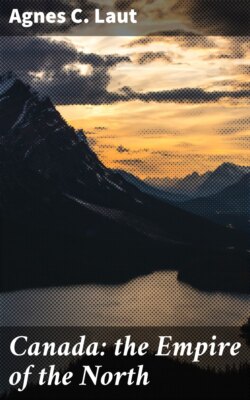Читать книгу Canada: the Empire of the North - Agnes C. Laut - Страница 28
На сайте Литреса книга снята с продажи.
AT EASTERN ENTRANCE TO HUDSON STRAITS
ОглавлениеWhen the ship runs aground and all hands must out to waist in ice water to pull her ashore as the tide comes in, Juett's rage bursts all bounds. As they toil, snow begins to fall. They are winter bound and storm bound in an unknown land. Half the crew are in open mutiny; the other half build winter quarters and range the woods of James Bay for game. Of game there is plenty, but the rebels refuse to hunt. A worthless lad named Green, whom Hudson had picked off the streets of London, turns traitor and talebearer, fomenting open quarrels till the commander threatens he will hang to the yardarm the first man guilty of disobedience. So passes the sullen winter. Provisions are short when the ship weighs anchor for England in June of 1611. With tears in his eyes, Hudson hands out the last rations. Ice blocks the way. Delay means starvation. If the crew were only half as large, Henry Green whispers to the mutineers, there would be food enough for passage home. The ice floes clear, the sails swing rattling to the breeze, but as Hudson steps on deck, the mutineers leap upon him like wolves. He is bound and thrown into the rowboat. With him are thrust his son and eight others of the crew. The rope is cut, the rowboat jerks back adrift, and Hudson's vessel, manned by mutineers, drives before the wind. A few miles out, the mutineers lower sails to rummage for food. The little boat with the castaways is seen coming in pursuit. Guilt-haunted, the crew out with all sails and flee as from avenging ghosts. So passes Henry Hudson from the ken of all men, though Indian legend on the shores of Hudson Bay to this day maintains that the castaways landed north of Rupert and lived among the savages.
